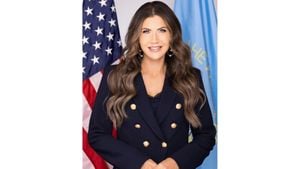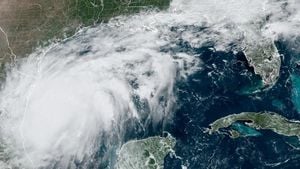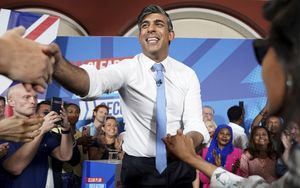President Prabowo Subianto of Indonesia has been making headlines recently for his active engagement on the international stage, particularly through economic initiatives and diplomatic efforts aimed at strengthening Indonesia's position globally. With his participation at significant events like the APEC Summit and discussions with world leaders, Prabowo seems focused on ensuring Indonesia’s growth and global presence.
Entering the arena at the APEC CEO Summit held on November 14, 2024, Prabowo expressed his determination to tackle poverty, which he identified as a pressing issue facing Indonesia today. "I would say we still have poverty at large scale which I’m determined to bring down. And we do have a significant percentage of our children malnourished,” he said, emphasizing the role of inclusive economic growth and collaboration among Pacific countries to achieve progress. The president noted, "Without growth, we cannot alleviate poverty, we cannot create relevant employment," clearly stating the link between economic development and societal welfare.
Statistics from the Indonesian Bureau of Statistics (BPS) reveal the poverty rate has slightly improved, dropping to 9.03 percent as of March 2024, with extreme poverty at 0.83 percent. Despite this progress, Prabowo acknowledges the challenges still faced by the nation, where malnutrition remains prevalent among children. To combat this, his administration has introduced flagship programs such as the Free Nutritious Meal initiative, set to commence January 2025, which aims to employ local community members to provide meals to millions of children around the country.
The APEC Summit not only served as a platform for discussing poverty alleviation but also as a ground for promoting the importance of innovation and investment, which are viewed as key players for economic development. This aligns with Prabowo's long-term vision for Indonesia to transition fully to green energy, aligning with global sustainability goals.
Building on the momentum, Prabowo has been vocal about enhancing Indonesia's international ties. For example, his recent discussions with Canadian Prime Minister Justin Trudeau have centered on boosting economic cooperation between Indonesia and Canada. Both leaders took time to reaffirm their commitment to strengthening bilateral relations, particularly through trade and investment opportunities. Prabowo underlined the significance of mutual benefit, stating, "We can achieve great things together if we work closely." Their discussions reflect not only immediate economic interests but also broader aspirations for long-term partnerships.
On another front, Prabowo has set his eyes on fostering stronger ties with Vietnam through the ratification of the Exclusive Economic Zone (EEZ) agreement. This agreement is expected to bolster economic cooperation and address maritime security, illustrating Indonesia’s proactive stance on regional issues. The discussions, taking place during his visit to Peru for the APEC Summit, show Prabowo’s commitment to engaging with Southeast Asian neighbors to fortify collective security and economic strategies.
His diplomatic approach extends to the Australian partnership. Alongside Australian Prime Minister Anthony Albanese, Prabowo discussed strategic ties and cooperation, especially focusing on defense and security issues. The duo's dialogue during recent meetings highlighted the importance of collaboration between the two nations to address shared regional challenges.
Meanwhile, Prabowo's recent engagement with New Zealand aligns with his broader goals. During meetings with New Zealand's Prime Minister Chris Luxon, the leaders discussed areas for strengthening economic ties, focusing on agricultural partnerships and technological exchanges. This cooperative effort is not only beneficial for Indonesia but also reinforces New Zealand's role as a partner in the Pacific.
Prabowo's multifaceted approach to international diplomacy is evident as he seeks to position Indonesia as a pivotal player within various global frameworks. He actively supports reforms within the World Trade Organization (WTO) to promote sustainable trade practices, aiming to align Indonesia's economic policies with global environmental standards. His administration seems committed to ensuring sustainable practices become the rightful approach to economic growth.
Within this empowered international dialogue, President Prabowo has also been addressing significant environmental issues. During his meetings, he has reiterated Indonesia's commitment to addressing climate change and environmental sustainability. He has emphasized the importance of collective efforts to mitigate climate-related risks, insisting on the commitment to achieve green energy transition. This approach reflects not just concerns over environmental sustainability, but also the economic potential of green sectors.
Prabowo’s initiatives, extending from social welfare to international cooperation, highlight how Indonesia is positioning itself to navigate the challenges of the 21st century. While he recognizes the dire issues of poverty, he zealously embraces the opportunities to engage globally, working toward changing Indonesia's narrative from merely being defined by its challenges to portraying the nation as one ripe with potential.
His engagement at global forums like APEC, coupled with strong bilateral relations with leaders worldwide, indicates Indonesia's readiness to be more than just a participant on the sidelines. Instead, it seeks to actively shape the global agenda, whether through economic, environmental, or diplomatic channels.
Through these actions and policies, President Prabowo manifests the ambition to revitalize Indonesia's economic and social fabric. The crux of his mission leans toward making substantial strides against poverty, establishing vibrant international partnerships, and attracting investments to facilitate sustainable growth. This contemporary diplomatic ideology signals Prabowo's belief not only in Indonesian resilience but also its pivotal role on the global stage.
Looking forward, the thrust toward modernization, sustainable development, and economic welfare underlines Indonesia's potential to emerge as a significant player among developing nations. President Prabowo appears dedicated to ensuring his administration's policies resonate both at home and abroad, thereby crafting a legacy of growth, cooperation, and resilience.



